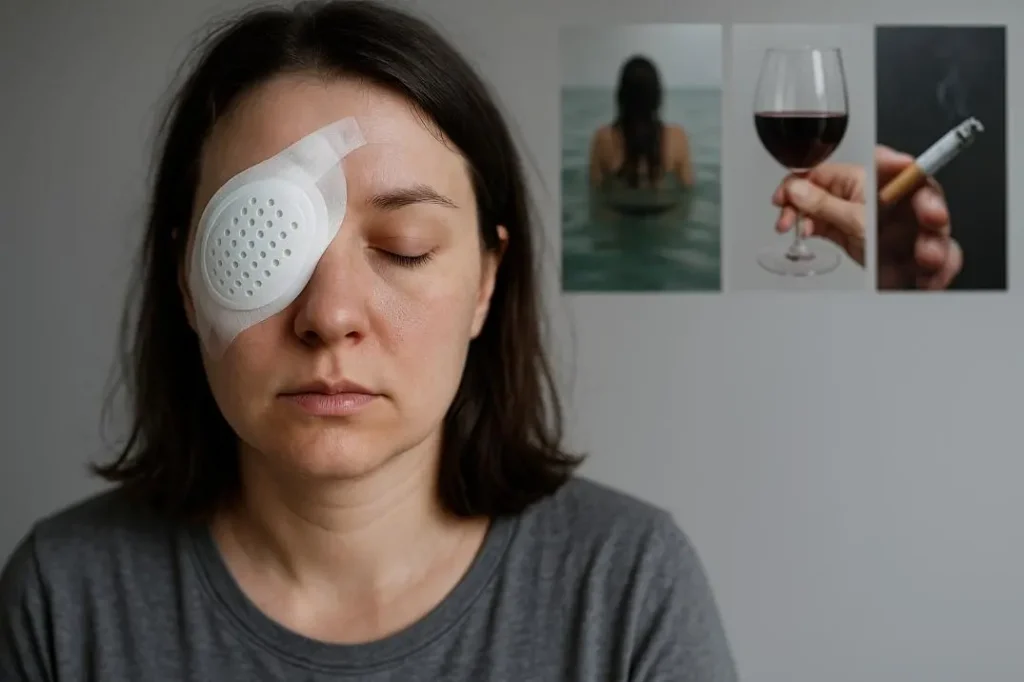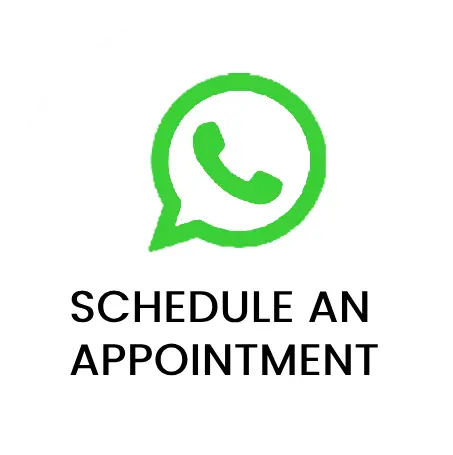What To Avoid After SMILE Eye Surgery?

AUTHOR
Ophthalmologist/ Eye Surgeon 13+ Years Exp
MBBS, MS – Ophthalmology
TREATMENT
CALL US 24/7 FOR ANY HELP
GET IN TOUCH ON
Taking the leap to undergo SMILE eye surgery can be life-changing. The thought of ditching glasses or contacts for good and enjoying clear vision is exciting. However, surgery is just step one. Your post-surgery care is just as crucial to ensure a smooth recovery and great results.
If you’re wondering, “What should I avoid after SMILE eye surgery?” you’re in the right place. I’ve compiled this comprehensive guide to give you the answers you need in a straightforward, conversational way.
Drawing upon insights from experienced surgeons and real-life stories, we’ll walk through all the details you’re curious about—from activities to habits to be mindful of. By the time you finish reading, you’ll feel equipped and confident about the steps to take (or not take!) following your surgery.
Your eyes deserve care, so let’s explore how to protect them post-op.
Why Is Post-Surgery Care Important?
Before we list the things to avoid, it’s helpful to understand why post-surgery care is so crucial. SMILE (Small Incision Lenticule Extraction) is a minimally invasive procedure, but it still involves reshaping the cornea.
While it’s incredible that the incision is tiny (just 2-4mm!), your eyes need time to heal fully for the surgery’s benefits to last.
Neglecting proper care can lead to complications or delay recovery. That’s why your surgeon emphasizes aftercare. It’s not just about healing faster but ensuring your vision correction remains stable for years to come.
Now, let’s get into the specifics of what to avoid after SMILE surgery.
1. Avoid Rubbing Your Eyes
This is the number one no-no after SMILE surgery. The tiny incision made during the procedure is delicate in the early healing stages. Rubbing your eyes could disrupt this healing process and increase the risk of infection or discomfort.
How to Resist the Urge
We all instinctively rub our eyes, so breaking this habit takes effort. Here are a few tips:
- Use artificial tears if your eyes feel gritty or dry.
- Gently pat around your eyes with a tissue if you feel irritated.
- Remind yourself that the itch will pass.
Doctor’s Note: “A patient once told me she set reminders on her phone every hour saying, ‘Don’t rub your eyes!’ It worked wonders for her recovery.”
2. Avoid Exposure to Dust and Pollutants
Your eyes are more vulnerable to infections after the surgery, and dust or pollutants can irritate them or introduce bacteria. Avoid environments where debris or particles could make their way into your eyes, like construction sites or smoky areas, for at least the first two weeks.
How to Protect Your Eyes
- Wear sunglasses, even indoors if there’s dust or smoke in your surroundings.
- Stay indoors on particularly windy or dusty days.
- If you work in a dusty job, ask your employer if you can take a few extra days off or work remotely.
Quick Tip: Keep an air purifier running at home to reduce airborne irritants.
3. Stay Away from Water Activities
Water feels harmless, but it can harbour bacteria that could lead to infections during your recovery. This includes swimming, hot tubs, and even shower water getting directly into your eyes.
How Long Should You Avoid Water?
- Swimming in pools, rivers, or oceans should be avoided for at least 2 weeks.
- Hot tubs or jacuzzis pose an even higher risk and should be kept off-limits for a month.
- Be cautious while showering to ensure water doesn’t run directly into your eyes.
Doctor’s Insight: “I always advise patients to keep their heads tilted back during showers initially. A patient once told me she bought a shower visor (designed for kids!) to make it easier.”
4. Avoid Strenuous Activities or Sports
It might be tempting to jump back into your workout routine, especially if you’re feeling fine, but your eyes aren’t ready for heavy exertion yet. Strenuous activities elevate your blood pressure, which can affect the healing process.
How Long Should You Wait?
- Light activities like walking? Fine after a couple of days.
- High-impact workouts like running or aerobics? Wait at least 2 weeks.
- Contact sports like basketball or boxing? Hold off for at least 4 weeks and consider wearing protective eyewear when you return.
Pro Tip: If you’re unsure about an activity, go for the “when in doubt, wait” rule.
5. Skip Eye Makeup
Makeup products, particularly around the eyes, can easily present an infection risk due to contamination. Avoid wearing eye makeup like mascara, eyeliner, or eyeshadow for the first week post-surgery. Even once it’s safe to reapply makeup, consider buying new products to reduce the risk of bacterial transfer.
Pro Hygiene Tips
- Wash your hands thoroughly before applying skincare or makeup around your face.
- Replace all open mascara, eyeliners, and brushes before resuming use.
Doctor’s Warning: “I had a patient who used an old makeup sponge just one week after surgery. She developed an infection and had to delay her recovery by a month. Don’t cut corners when it comes to hygiene!”
6. Take Breaks from Screens
Between work, social media, and binge-watching, it’s nearly impossible to escape screens nowadays. However, excessive screen time can strain your healing eyes, causing dryness and delayed recovery.
Manage Screen Time
- Avoid screens for at least the first day after surgery.
- Follow the 20-20-20 Rule after that: Every 20 minutes, look away from the screen for 20 seconds at something 20 feet away.
- Use blue-light-blocking glasses to reduce strain if absolutely necessary.
7. Avoid Smoking and Alcohol
Both smoking and alcohol can slow the healing process:
- Smoking: The smoke and toxins irritate the eyes and increase the risk of infections.
- Alcohol: It can dehydrate your body, leading to dryness in your eyes.
How Long Should You Wait?
- Avoid alcohol for at least 48 hours after surgery.
- Quit smoking permanently, if possible. If not, try to abstain for the first few weeks.
Life Advice Tip: Use this opportunity as a motivating factor to break free from smoking altogether. It benefits not only your eyes but your overall health.
8. Delay Driving
Your eyes may not be stable enough for driving in the first few days after surgery. Depth perception, night vision, and sensitivity to light can all be temporarily affected.
When Can I Drive?
- Most patients can drive after 2-3 days, but it depends on individual recovery.
- Always confirm with your doctor before getting behind the wheel.
9. Don’t Skip Follow-Up Appointments
Your aftercare doesn’t end when you leave the surgery clinic. Regular check-ups with your surgeon are vital to monitor healing and ensure everything is progressing as expected.
Follow-Up Schedule
- Most surgeons schedule the first follow-up within 24-48 hours after surgery.
- Subsequent visits may occur 1 week, 1 month, and 3 months later.
Final Doctor’s Note: “Follow-up appointments give us a chance to catch and address potential issues early. Remember, we’re only a call away if you have concerns.”
Final Words of Advice
Healing from SMILE eye surgery is simpler than you might think, but it takes care and caution. By avoiding the temptations to rub, strain, or expose your eyes to risk, you’re setting yourself up for a successful recovery and long-lasting results.
Take it one day at a time, listen to your doctor, and give your eyes the love they deserve. Before you know it, you’ll be enjoying the freedom of clearer sight without worrying about glasses or contacts.
If you’re still unsure about anything, don’t hesitate to reach out to your eye care provider. Remember, no question is too small when it comes to your vision!
AUTHOR
Ophthalmologist/ Eye Surgeon 13+ Years Exp
MBBS, MS – Ophthalmology
TREATMENT
CALL US 24/7 FOR ANY HELP
GET IN TOUCH ON



